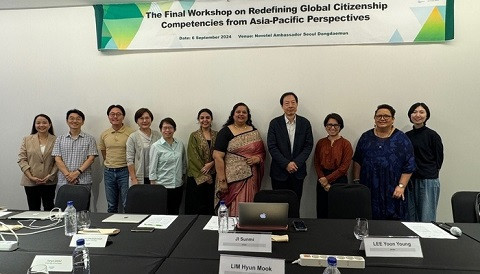
GCED Basic Search Form
Quick Search
You are here
News

The Asia-Pacific Centre of Education for International Understanding (APCEIU) held its final workshop on Redefining Global Citizenship Competencies Asia-Pacific Perspectives on 6 September. The workshop was organised ahead of the publication of an academic book introducing new approaches to reconceptualising global citizenship competencies that reflect the Asia-Pacific context. Researchers from Pakistan, India, Thailand, Singapore, China, Japan, South Korea, New Zealand, and Kazakhstan gathered in Seoul to share the contents of their draft manuscripts and to discuss the finalisation of the project. The researchers also participated as moderators, speakers, and attendees in the 9th International Conference on Pedagogy and Practice for Global Citizenship Education, held on 4-5 September. They shared their experiences and research on global citizenship education contributing to the revitalisation of multilateralism and peace in various regions of Asia and the Pacific.
The workshop began with opening remarks from Director LIM Hyun Mook of the APCEIU, followed by participant introductions, presentations, and discussions. The researchers proposed new possibilities for defining global citizenship based on traditional Asian religions and cultures such as Confucianism, Buddhism, and Islam, as well as Pacific wisdom and the philosophy of Tagore. They presented specific examples of how Global Citizenship Education (GCED) has been interpreted and implemented in East Asia (China, Japan, and Korea) and Central Asia, exploring the potential for fostering global citizenship through national policies and educational reforms. They also discussed methods for integrating local and universal perspectives and the role of national citizenship in global citizenship education.

The researchers delivered presentations on the following topics:
- Professor Aigul KULNAZAROVA (Tama University, Japan) presented on “Global Citizenship in Central Asia: Contested, Transformed, and Challenged”, addressing the historical context and current trends of GCED in the region;
- Professor Kyujoo SEOL (Gyeongin National University of Education, Korea) introduced the direction of global citizenship education using the example of Korea's "Statue of Peace", reflecting local history and universal values;
- Professor Mousumi MUKHERJEE (O.P. Jindal Global University, India) introduced her chapter, which explores Tagore’s philosophy of education and pedagogic praxis, as well as three dimensions of GCED competencies relating to his ideas;
- Dr. Sicong CHEN (Kyushu University, Japan) presented on “The Direction of Global Citizenship Education in Asia: Beginning with Locality and Expanding to Universality”, defining global citizenship as “taking actions based on an ethical concern for humanity and a political consciousness of criticality”;
- Dr. Suzanne CHOO (Nanyang Technological University, Singapore) emphasised the significance of Confucian cosmopolitanism as a virtue in global citizenship competencies, particularly in response to political wokism, post-truth, and postmodernism of the 21st century;
- Dr. Tania SAEED (Lahore University of Management Sciences, Pakistan) illuminated the relationship between Sufism and global citizenship education in her presentation titled "Identity, Rituals, and Religion: Reflections on Sufism and the Quest for Global Citizenship Education from a South Asian Perspective.";
- Dr. Tanya SAMU (University of Auckland, New Zealand) introduced her manuscript "Global Citizenship Competencies and Indigenous Pacific Ways of Being, Knowing, and Doing: Exploring the Possibility of New Starpaths," focusing on Tapasā cultural competencies for teachers in New Zealand;
- Dr. Thippapan CHUOSAVASDI (Chulalongkorn University, Thailand) proposed a redefinition of GCED based on Buddhist concepts in her presentation titled "Tolerance, Interdependence, and GCED".

In the discussion that followed the presentations, the researchers continued their dialogue on the overall tone and direction of the book. They emphasised the need to critically review and clearly define the meanings of terms that are repeatedly used throughout the research in the introduction. They also decided to clarify that the study is not intended to reinforce the “East-West” binary or promote self-orientalisation, but rather to equally address the Asia-Pacific perspectives on Global Citizenship Education (GCED).
APCEIU plans to publish the research findings on the redefinition of global citizenship competencies from Asia-Pacific perspectives in November. In connection with this, a webinar will be held to introduce the results of the research and explore original ways to define global citizenship competencies that reflect the diverse histories, cultures, and contexts of the Asia-Pacific region.
